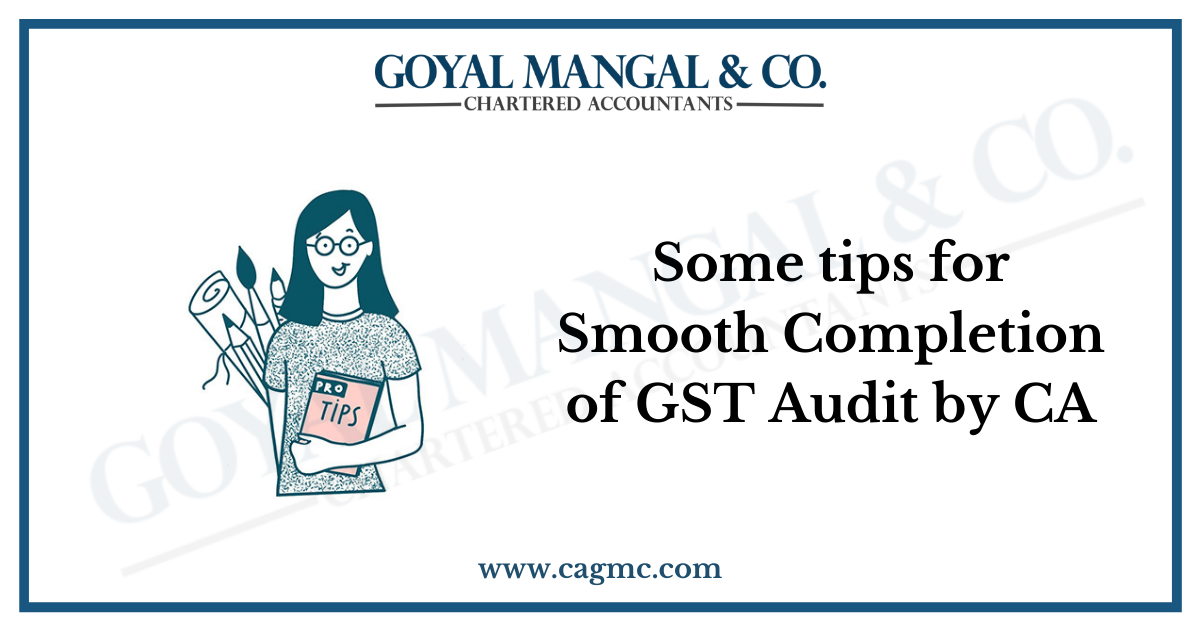
Some of the useful tips that should be followed for smooth completion of GST audit:
- Planning meeting by GST auditors:
The taxpayers are advised to have a pre- meeting with the GST auditors to have a proper understanding of the requirements of the GST audit by CA. Prior meetings with GST auditors will help a taxpayer to understand and prepare the data as per the requirements. This has been seen that CAs faced difficulties while filing Annual GST returns as the clients do not provide all the information and documents as they have not maintained the same while doing the transaction.
The taxpayer would need to ensure proper disclosures in annual returns, with no room for errors. The information required for filing annual return must be collected by proper accounting or recording software to avoid any complication because it becomes to re- collect/ re-capture the data while filing the annual return if it is not done at the time of recording. - Proper accounting and reporting software:
One should revisit or check their IT system/ accounting packages to ensure that the software should be upgraded as per the changing needs of the companies because we have often seen that there is no availability in the accounting software used to store the data required for filing annual returns. It is also necessary to use accurate accounting software while collecting data for filing annual returns.
So one should upgrade their software without any second thought as authorities will also enforce the laws and regulations strictly. - Segregation of ITC invoices matching with GSTR-2A:
GST works on matching principle so it would be best if you segregate the purchase invoices appearing in the GSTR- 2A with those not appearing in the GSTR- 2A. Those invoices which are identical with GSTR- 2A get auto validated and thus auditors may rely on the same without having a look at physical documents.
This will save a lot of time, time to time reconciliation of transactions with GSTR- 2A also keeps a check on the quality of vendor with whom we are dealing with. Taxpayers with lesser number of transactions can use excel sheets while taxpayers with larger number of transactions may require the help of some software to complete reconciliation part.
This costs the taxpayer a bit but given that this may have an impact on direct cash flows by saving ITC not being taken by the company. - Inter- company transactions:
The taxpayer should take care of those transactions that haven’t accounted for within the books of accounts but subject to GST just like the transfer of stocks between units of an equivalent company free of cost because, if found by authorities later then these transactions will attract interest and penalty.
So the auditor should keep a keen eye on inter -company transactions. We have seen many advance rulings in respect of these even specifying that head office salaries should be cross charges to the respective locations as they providing services across locations. These transactions are revenue neutral for the companies, however, may have an impact on business unit/cost centre profitability. - Timely reconciliation of ITC with books of account:
Generally, taxpayers don’t have any problem in the reconciliation of the sales as per books viz. sales as per GST returns. Mainly challenges faced by the taxpayers are related to the reconciliation of ITC. First the data of ITC needs to be bifurcated into various categories like inputs, capital goods, and input services. Further, ITC also needs to be categorized as RCM, regular, Imports, ISD, etc.
Thus, the reconciliation of ITC becomes one of the most difficult tasks for any taxpayer and so this activity should be done periodically to avoid last minute hassles. - GSTIN wise trial balance:
The one of the most important requirement of the GST audit by a CA is to have GSTIN wise trial balance for a company with registration in various states but generally, it is not possible to have GSTIN wise trial balance for a company. In such a case it becomes difficult for the auditors as well as the company to fulfil the requirement of the law because this requirement of law is practically not possible as the companies though have registrations under different states, have a common bank account, common debtors and creditors.
In this case, companies are advised to use cost or profit centres to record their profit and loss transactions so that separate information of income and expenditure can be given and the companies should also ensure the accurate recording of information.


